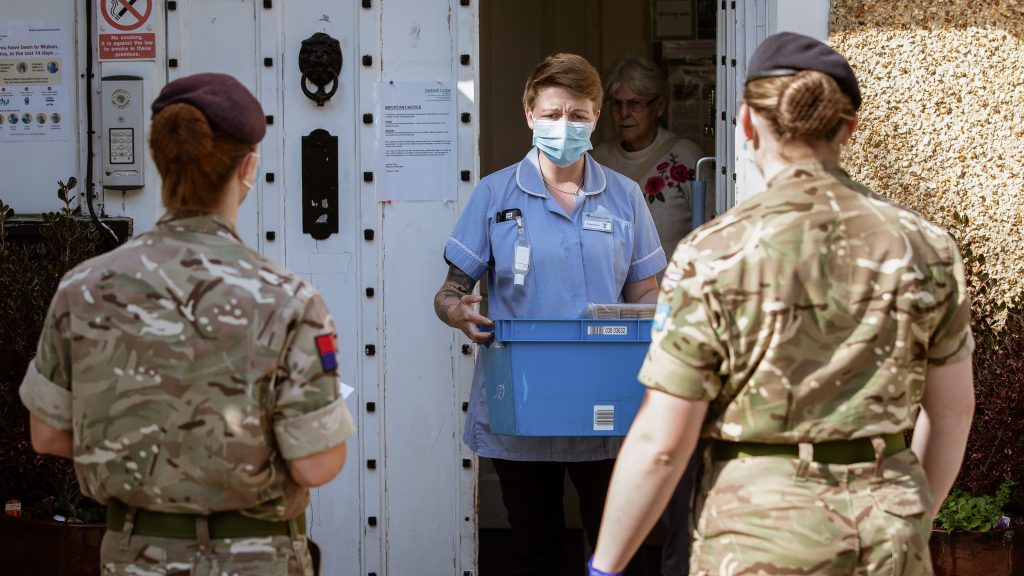
The Ministry of Defence is rebalancing the structure of its Covid Support Force (CSF) to ensure our Armed Forces are used in the most effective way possible in the fight against Covid-19 and wider defence of the UK.
The CSF was established in late March in anticipation of a sharp increase in requests for Military Assistance to the Civilian Authorities (MACA) as the Government stepped up its response to the global pandemic.
|
Get weekly jobs and transition advice. Unsubscribe anytime. |
Approximately 20,000 personnel with appropriate planning, logistical and medical expertise have been held at higher readiness since then, with around 4,000 personnel deployed on any given day.
162 MACA requests have been answered since the establishment of the CSF, including helping to build Nightingale hospitals, delivering PPE to hospitals and Local Resilience Forums, carrying out medical evacuations of patients from across the entire UK, from the Orkney Islands to the Channel Islands, and setting up Mobile Testing Units everywhere between.
Military personnel have also been supporting the response behind the scenes, with personnel deployed to other government departments to support national-level strategy formation, procurement and countering disinformation.
Due to the public’s adherence to lockdown measures and the ability of other government departments to maintain essential services, demand for the CSF has stabilised and there is currently no need for so many troops – the largest number ever allocated to a domestic operation during peacetime – to be held at such high readiness. The force will now undergo a conditions-based re-balancing, which has been planned in consultation with other government departments. It is currently determined that 7,500 personnel must remain at higher readiness to fulfil current CSF tasks and respond to all future requests. This will be kept under review as work to tackle the coronavirus pandemic continues and numbers will continue to reduce and increase as demand dictates.
Defence Minister James Heappey said:
“Whilst we no longer need 20,000 troops at high readiness, they’ve not gone anywhere, they’re still available to respond to further Covid19-realted tasks and we can return them to high readiness if the need arises.
“But if you have a lot of troops at high readiness, it has an impact on their lives and the training they can do.
“We are acutely aware that if we have a large number of troops at high readiness, they can’t be training for operations and contingencies we might need them for in the near future.
“In a post-Covid world that will be more uncertain, that leaves the nation less safe.”
The CSF will continue assisting civilian authorities wherever required and no personnel – regular or reserve – will be withdrawn from tasks while the demand remains. This week, the CSF will deliver testing kits to care homes using 20 specially designated vehicles, having already delivered more than 29,000 to 190 facilities. Defence medics will still provide direct medical assistance while other personnel will deliver PPE, maintain the national testing capacity and conduct a vast array of other duties.
The 12,500 being released will be returning to a range of normal duties, including preparations to deploy on future operations at home and overseas. Releasing personnel from such high readiness allows them to complete training exercises that ensure they have the right skills to operate safely and effectively, whether that be for scheduled rotations on ongoing operations or ensuring they are ready to respond to any unexpected threats.
The forces allocated to critical defence outputs, such as counter-terrorism operations and the Continuous At Sea Deterrent, remain available at extremely high readiness if required.
Standing Joint Commander, Lt Gen Tyrone Urch said:
“I have been humbled by the agility and professionalism of our people who have delivered on every request that has come our way – from helping to build the Nightingale hospitals and redesigning military equipment for use with the NHS, to running the mobile testing units across the UK.
“Behind the scenes, we have established a critical network of liaison officers and strategic planning teams embedded at all levels across government departments, the Devolved Administrations, the NHS and the emergency services.
“As we adapt the force to the constantly evolving requirement, we will continue to bring that spirit and innovation to support the Government in the battle against coronavirus.”
In response to the evolving national situation, the Aviation Task Force’s assets will also be restructured and 2,000 of the reservists who volunteered for mobilisation but are no longer required to fulfil MACA tasks are being engaged about the processes for demobilisation. This will be taken forward with a view to mitigating the impact both to them and their employers. They are testament to the nation’s resolve in this crisis and the MOD is grateful for their enduring commitment.